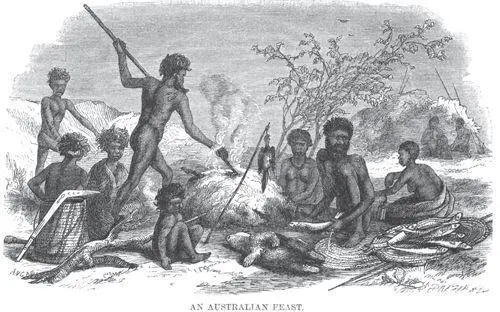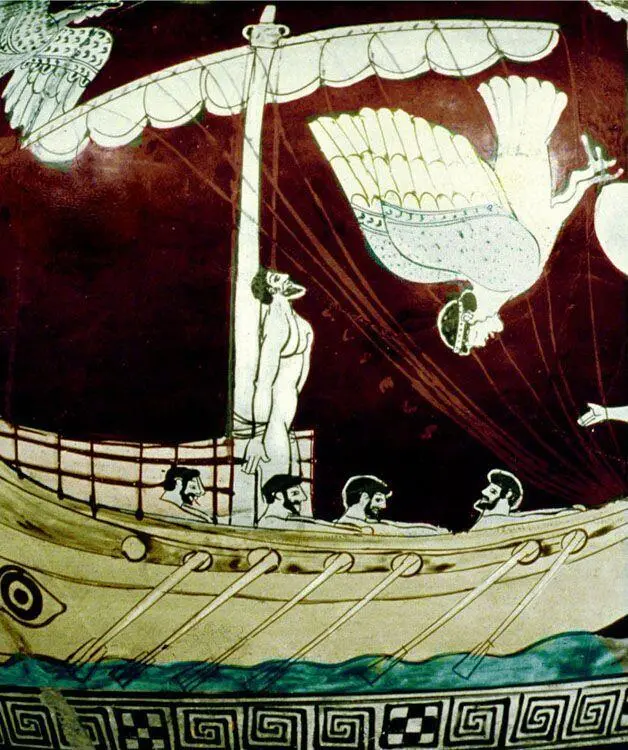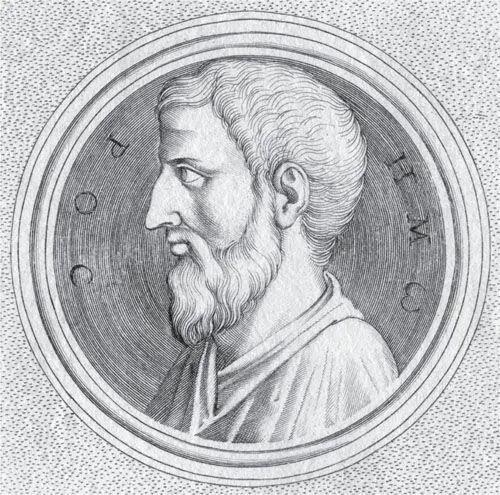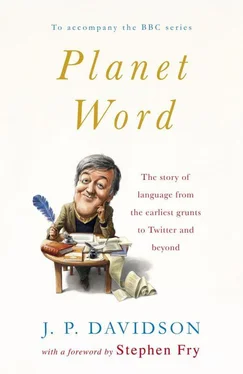There was a giant ferocious emu named Tchingal, who ate people. His home was in the scrub, where he was hatching a giant egg. One day, Waa the crow flew past and, feeling peckish, started to eat the egg. When Tchingal came back and saw this he was furious and chased Waa all over the place and each time he escaped Tchingal crashed into mountains creating the gaps in the rocks and the streams than run through them.
So do Aborigines sing their stories because songs tend to be more memorable?
Ernie explains, ‘It’s both a rhyme and rhythm, and the rhythm is the heartbeat. You sing this, your heartbeat can tell you how much time you’ve got to travel. So the song that you sing, if it’s a good old slow song, you know that this is a long journey, before you get to the next part of the verse. The story will stay similar to the rhythm of the walk and it tries to get your heart to pace you so that your step paces you to the next location in the song.’

Songlines explore themes of hunting and fertility and each Aborigine tribe has their own set of stories
The Songlines are a brilliant, practical way of navigating. They tell you compass points, give you landmarks (depressions in the land, for instance, are remembered in the songs as the footprints of the creator beings), and reinforce the identity of each tribe by making everyone learn by heart their collective history. They also, as any parent will know who’s tried to coax a child on a long walk, provide sufficient distraction and entertainment to make the journey more bearable.
If you like a gripping story, packed with adventure and heroic exploits, jealousy and loyalty, friendship and family, love and loss, and the yearning to find the way home, then read — no, listen to — this:
Tell me, Muse, of the man of many ways, who was driven
far journeys, after he had sacked Troy’s sacred citadel.
Many were they whose cities he saw, whose minds he learned of,
many the pains he suffered in his spirit on the wide sea,
struggling for his own life and the homecoming of his companions.
Even so, he could not save his companions, hard though
he strove to; they were destroyed by their own wild recklessness,
fools, who devoured the oxen of Helios, the Sun God,
and he took away the day of their homecoming. From some point
here, goddess, daughter of Zeus, speak and begin our story.
It’s the opening lines to the Odyssey (from a translation by Richard Lattimore), the towering epic poem of the trials and tribulations of the Greek warrior Odysseus, as he tries to sail home to Ithaca after the fall of Troy.
Homer’s Odyssey may be Western literature’s first — and some would say most influential — work but it was not a written creation. It was born out of, and shaped by, an ancient oral tradition which memorized and passed on stories, cultural values and information from generation to generation, long before we learned to write. It’s more song than words.
Except that, at some point, it was written down. We’re not sure when and we’re not sure by whom: probably some time around the late eighth century BC, by a man we call Homer, but who might have been more than one person, according to scholars. Around the same time, a few decades earlier, probably, Homer’s other masterpiece, the Illiad , was also written down, and together they form the bedrock of the Western literary tradition.
Homer’s epics are great yarns, wonderful stories and, far more, they create vivid worlds of complex human desires and contradictions, where people love and suffer, fight and die, live with dignity or dishonour, struggle against misfortune and tragedy and fate. The characters try to understand the world they live in, the physical and the unseen, against a backdrop of heroic deeds and all-too-human gods. Like all the best tales, they’re in essence stories of the human condition, and their depictions of the ancient world, their plots, styles, literary devices and imaginative sweep have soaked into our culture, language and art. Every epic journey, road movie, every tale of the returning warrior, every story of the absent father and the coming-of-age son, Dante’s Inferno , the epic poetry of Milton and Pope, the classical poets, the Romantics, James Joyce’s Ulysses — they all owe their inspiration and origin to Homer’s Odyssey .
The Greeks themselves considered the Illiad Homer’s greatest work; and it was the story of Achilles, and not the wanderings of Odysseus, which Alexander the Great took with him as bedtime reading on his campaigns. Both poems draw their inspiration and material from the Trojan War myths. You know the story: Helen seduced by Paris and whisked off to Troy, the face that launched a thousand ships, Agamemnon leading the Greeks against King Priam in the ten-year-long war, the burning towers of Ilium, Achilles dragging the body of Hector round the walls of the city, the Trojan horse and the fall of Troy. And then one of the Greek generals, Odysseus, gets lost on his way home. It’s the ancient world’s equivalent of the greatest road movie ever — except it was by boat.
It’s the Odyssey which has given us some of the greatest stories and adventures in literature, as Odysseus and his men meet one obstacle and disaster after another: navigating between the lethal whirlpool and rocks of Scylla and Charybdis; being captured by the one-eyed Cyclops Polyphemus, whom Odysseus blinds with a stake so that he and his men can escape clinging to the undersides of the Cyclops’ huge sheep.
Things are always going wrong, working against Odysseus getting safely home, either because of the gods or the stupidity of the men, or the weather. Like when Aeolus, the master of the winds, gives Odysseus a leather bag containing all the winds, except the west wind, to speed him home safely. The sailors think the bag’s got gold in it, and they wait until Odysseus is sleeping and then open it. All the winds fly out in a fury, and the resulting storm drives the ships back the way they had come — just as Ithaca had come into sight. Then there is the episode when Odysseus decides he wants to hear the irrisistible song of the Sirens, who would lure sailors to their death on the rocks. He gets his crew to plug their ears with beeswax and tie him to the mast, with strict orders not to untie him, no matter how much he begs. So there he is, writhing against the creaking mast, straining towards the singing

Homer’s Odyssey may be Western literature’s most influential work

Homer wrote epics full of vivid worlds and complex human desires
So they sang, in sweet utterance, and the heart within me desired to listen.
And so it goes on, twenty-four books and 12,000-odd lines of pacy, vivid poetry which have burrowed deep into our Western collective imagination in the same way as the Bible stories have done.
The mystery of who Homer was and the scholarly debates about the exact origins of these epic poems only add to the allure. There’s no trustworthy information about the life and identity of Homer which have come down to us. All we have is what we read that the ancient Greeks believed, people like Herodotus, who thought Homer lived about the ninth century BC, and Aristarchus of Alexandria, who offered a much earlier date — he believed Homer lived about 140 years after the Trojan War (which we date around 1200 BC). The Greeks believed Homer was blind, and some thought he came from Chios, others from Smyrna. They also assumed that he was a poet who wrote. There was disagreement about when the poems assumed their final shape, and whether different poets wrote the Illiad and the Odyssey — but everyone, all the way down to Alexander Pope in the eighteenth century, assumed that Homer was a poet who composed with the written word.
Читать дальше















